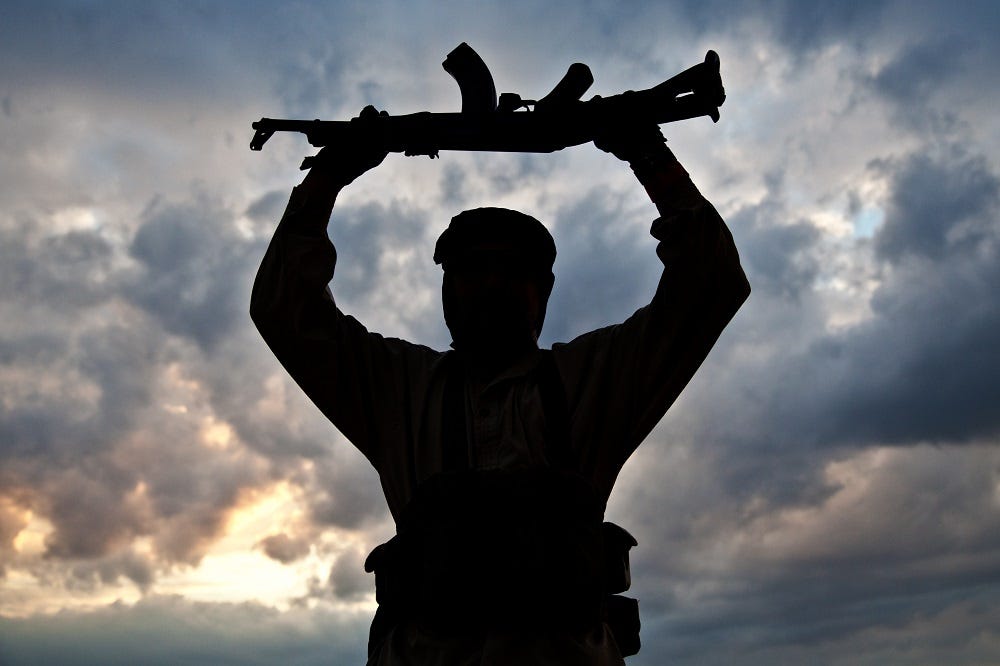Captured ISIS sultan confesses to invading Kazakhstan
Another beautiful checkmate
Good news, everyone.
The terrorists in Kazakhstan have been neutralized. There will be no more monkey business from the repulsive, cattle-tagged, forced-injected vermin. The noble Kazakh government—a beacon of multi-polar virtue—has triumphed once again over the forces of darkness.
It’s obvious that the CIA personally trained all the disaffected Kazakhs who came out into the streets—many of them peacefully. We know this because a senior sultan from Islamic State was captured and confessed to his terrible crimes:
Wait a second… is that…Vikram Ruzakhunov, Kyrgyzstan’s favorite jazz pianist? Yes, it is!
He was playing jazz in Kazakhstan when the protests broke out. Then some friendly security-type people detained him and obtained a completely voluntary confession:
A man with bruised face shown by Kazakhstani media [and SouthFront], identified as the touring performer, was shown admitting to having been paid to participate in a protest that led to riots. Concerns were expressed that the clip was recorded under duress.
“He’s not a terrorist. He’s an ordinary citizen, a musician, a decent man,” Kamchybek Tashiyev, head of the Kyrgyz State Committee for National Security, told reporters at the protest. “We checked through all of our channels this morning: Vikram Ruzakhunov didn’t participate in riots and street marches.”
Checkmate, we got him!
Great reporting, SouthFront. We have a minor correction, though:
Don’t worry, he wasn’t beaten. He confessed to crimes he didn’t commit because he was informed that would be the quickest way to get released and sent back to Kyrgyzstan. That’s what Vikram told the media and there is no reason to doubt him—ignore the bruises all over his face.
This is a really good look for the Incredulous Russophile Media—basing your 5D chess analysis on a forced confession from a jazz pianist.
Quite telling, actually. Makes us think…
By the way: check out this cool YouTube tutorial explaining how to play the Islamic State anthem on the piano:







Priceless! Thank you, Edward. I missed that story, so I with pleasure looked it up in different sources.
However, without justifying behavior of Kazakh authorities we need to understand the broader scope and for that we need to listen to interview of Ruzakhunov after his return to Kyrgyzstan. Here is the link to that interview video https://youtu.be/h1PR6XN9FGg, but since most readers of this blog don't speak Russian, let me do a quick recap. Vikram basically says that he was in Kazakhstan with his performances, but, as riots started, he, against the advise of his Kazakh friends to stay low in his apartment in Kazakhstan, decided to head home from Almaty. He actually flew to Almaty from Bishkek on the way there, but since airport was blocked for passenger travel he decided to hire a taxi (private car) to go back home. He was stopped by military checkpoint not far from border and detained for questioning. Vikram says that he got his bruises not in detention cell or in police department office, but when he was detained by military. He also said that this statement "I was unemployed in Kyrgyzstan and some people called me and offered me 90K tenge ($200) to participate in the meetings" he told police based on advice of his cellmates, since they said, as result of it they will deport you quickly to Kyrgyzstan, which happened promptly after him admitting his "crime". Now, considering that for taking part in protests there were indeed many unemployed in Kyrgyzstan, Tajikistan and Uzbekistan that were hired to come to Kazakhstan and take part in protests in Southern Kazakhstan region that borders with these countries, could we give a bit of leeway to Kazakh authorities for showing excessive eagerness in dealing with these "imports"?
Similar story, btw, happened during Ukrainian Maidan of 2014 when thousands of unemployed people from Western Ukraine were brought to Kiev to create crowd effect on the Independence square - the heart of protests. When sharp shooters from Georgia brought in by Maidan organizers killed round 100 protesters to give Maidan victory a final push, blaming shooting on then president Yanukovich, nationalist propaganda named murdered protesters "nebesna sotnia" (heavenly hundred) while Kievites called them "nemestna skotnia" (out-of-town cattle).
So what's the lesson of this story? The lesson here is that we need to look at the situation in a broader way, trying to understand all the context and motivation for actions on both sides of the story.
LOL, Kyrgyz / Kazakh war when?